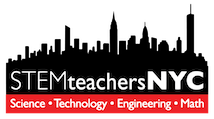This workshop series will be led by teacher-leaders from our Culturally Responsive Teaching in STEM Task Force.
Guiding Principles & Goals
The Dimensions of Responsiveness in STEM workshop will be grounded in the guiding principles developed by our CRT Taskforce, including: Establishing inclusion by considering and building on the diverse needs, assets and contexts of STEM educators and students; Drawing connections with real-world issues to build relevancy, meaning and motivation for students; Encouraging a definition of Responsive and Active Teaching that incorporates hands-on, active learning strategies that consider participants’ learning needs and styles, and are grounded in a multicultural and everyday contexts and that build relevancy and motivation for students.
Description
A comprehensive, multi-layered deep dive into CRT, this four-session intensive workshop series will build on STEMteachersNYC CRT Task Force programming and create a space for participants to work together to co-generate a set of contextualized outcomes. The Dimensions of Responsiveness in STEM series will include a “Know Your Biases” module, with a focus on uncovering and characterizing teachers’ individual biases. Additional modules include grounding lessons in student perspectives, unpacking content and pedagogical biases, using a design thinking approach to resolving a problem of practice, and embedding a strategy to address issues of equity and/or to adapt a lesson or unit. We will also layer in discussion focused on tech tools in the larger context of remote learning, where we will use a framework to examine how online learning has potentially created new inequities or ameliorated existing ones in the science classroom. The workshop will be open to both classroom STEM teachers as well as out-of-school time (OST) educators in an effort to address context-specific challenges and to learn from each others’ experiences. By collaborating in this workshop, classroom and OST STEM educators will jointly build personal and shared reflection tools to foster Culturally Responsive and Sustaining Education practices in their lesson planning and execution. Participants will leave with a set of tools and strategies to revise lessons and units, and a catalogue of examples developed during the workshop by fellow participants.
All grades welcome. Registration for each part must be made separately.
Part 1: Student Perspectives
December 6, 2020
Part 2: Personal Biases
January 24, 2021
Part 3: Content Biases
February 7, 2021
Part 4: Pedagogical Biases
March 7, 2021

